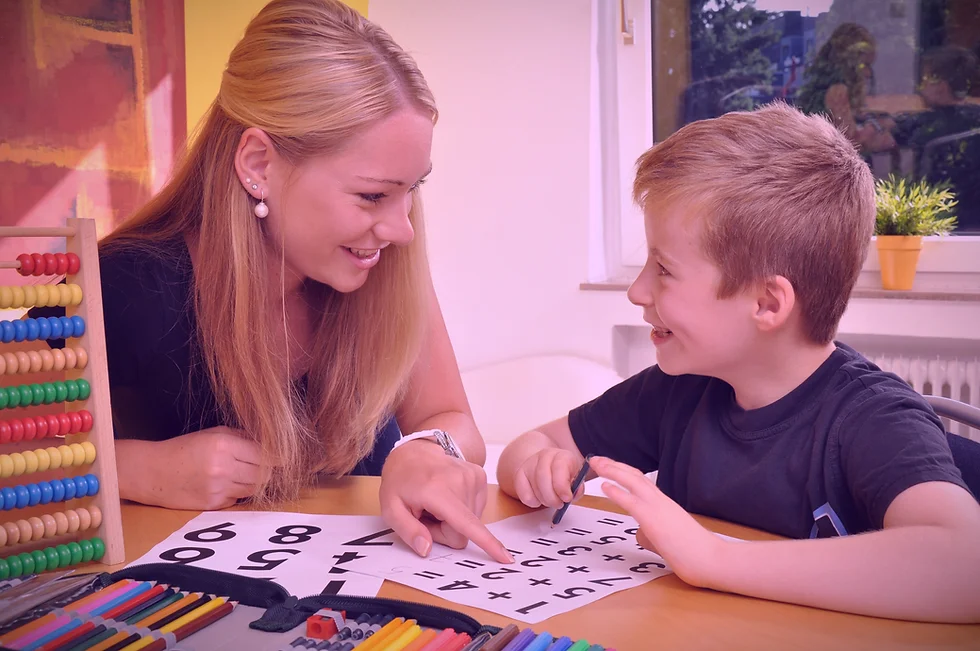What is dyscalculia?
Dyscalculia is a specific learning disability that affects an individual’s ability to understand and work with numbers. It is a neurological condition that can make it challenging for children to grasp basic mathematical concepts, perform calculations, and apply numerical reasoning in everyday life. Unlike dyslexia, which primarily impacts reading and language skills, dyscalculia specifically targets the development of numerical and mathematical abilities.
Children with dyscalculia may struggle with a range of mathematical tasks, such as counting, recognizing numerical patterns, understanding place value, performing basic arithmetic operations, and applying mathematical reasoning to problem-solving. These difficulties can have a significant impact on a child’s academic performance, confidence, and overall success in STEM-related subjects.
READ ALSO :
Understanding the challenges faced by children with dyscalculia
Children with dyscalculia often face a unique set of challenges that can make it difficult for them to thrive in a traditional math-focused educational environment. Some of the common challenges they encounter include:
- Difficulty with number sense: Dyscalculic children may struggle to understand the relationship between quantities and the relative size of numbers, making it challenging to grasp basic mathematical concepts.
- Weak memory and recall: Remembering and recalling mathematical facts, such as multiplication tables or number sequences, can be a significant challenge for children with dyscalculia.
- Spatial and visual processing issues: Dyscalculic children may have difficulties with spatial awareness, visual-motor coordination, and interpreting visual information, which can hinder their ability to understand and apply mathematical concepts.
- Anxiety and frustration: The persistent difficulties in mathematics can lead to feelings of anxiety, frustration, and low self-confidence, further exacerbating the challenges faced by children with dyscalculia.
- Lack of specialized support: Many schools and educators may not have the necessary resources or specialized training to provide tailored support for children with dyscalculia, leaving them feeling isolated and unsupported.
The role of educational apps in supporting children with dyscalculia
In recent years, the emergence of educational technology has opened up new avenues for supporting children with dyscalculia. Educational apps can play a crucial role in addressing the unique challenges faced by these children and unlocking their mathematical potential.
Educational apps offer several benefits for children with dyscalculia:
- Personalized learning: Apps can be designed to provide personalized, adaptive learning experiences that cater to the individual needs and learning styles of each child.
- Multisensory approach: Many educational apps incorporate a multisensory approach, using visual, auditory, and kinesthetic elements to reinforce mathematical concepts, which can be particularly beneficial for dyscalculic children.
- Engaging and motivating: Well-designed educational apps can make learning math fun and engaging, helping to boost a child’s confidence and interest in the subject.
- Immediate feedback and progress tracking: Apps can provide instant feedback on a child’s performance, allowing them to identify and address areas of weakness, while also tracking their progress over time.
- Accessible and convenient: Educational apps can be accessed on a variety of devices, making them readily available and convenient for children to use both in and out of the classroom.
Criteria for choosing the best educational apps for children with dyscalculia
When selecting educational apps to support children with dyscalculia, it is essential to consider the following criteria:
- Alignment with learning needs: The app should be specifically designed to address the unique challenges and learning needs of children with dyscalculia, targeting areas such as number sense, visual-spatial processing, and problem-solving skills.
- Multisensory approach: The app should incorporate a multisensory approach, utilizing a combination of visual, auditory, and kinesthetic elements to reinforce mathematical concepts.
- Personalized and adaptive: The app should offer a personalized and adaptive learning experience, adjusting the difficulty and content based on the child’s individual progress and performance.
- Engaging and motivating: The app should be visually appealing, interactive, and designed to keep the child engaged and motivated throughout the learning process.
- Comprehensive and progressive: The app should provide a comprehensive curriculum that covers a wide range of mathematical topics, with a progressive approach that gradually builds upon the child’s skills and knowledge.
- Ease of use and accessibility: The app should be user-friendly, intuitive, and accessible for children with dyscalculia, with clear instructions and navigation.
- Parental and educator support: The app should offer resources and support for parents and educators to help integrate the app into the child’s learning activities and monitor their progress.
Top educational apps for children with dyscalculia
Based on the criteria outlined above, here are some of the top educational apps that can be particularly beneficial for children with dyscalculia:
| App Name | Key Features |
|---|---|
| 1. Dybuster Calcularis | – Personalized and adaptive learning experiences – Multisensory approach with visual, auditory, and kinesthetic elements – Comprehensive curriculum covering a wide range of mathematical topics – Progress tracking and performance analysis for parents and educators |
| 2. Touchable Math | – Engaging and interactive math games and activities – Focuses on developing number sense and basic arithmetic skills – Incorporates a multisensory approach with visual, auditory, and tactile feedback – Customizable settings to accommodate individual learning needs |
| 3. Motion Math: Algebra | – Designed to help children with dyscalculia transition from basic math to algebra – Utilizes a visual and interactive approach to teach algebraic concepts – Provides step-by-step guidance and immediate feedback – Offers progress tracking and reporting for parents and educators |
| 4. DragonBox Math | – Gamified learning experience that makes math fun and engaging – Covers a wide range of mathematical topics, from counting to algebra – Personalized learning paths based on the child’s progress and performance – Supports multiple languages and can be used on various devices |
| 5. Prodigy Math | – Integrates math learning into an engaging, fantasy-themed game – Offers a comprehensive curriculum aligned with educational standards – Provides personalized learning and adaptive challenges – Includes progress tracking and reporting for parents and educators |
Features and benefits of each recommended app
1. Dybuster Calcularis:
- Dybuster Calcularis is a comprehensive app designed specifically for children with dyscalculia, offering a personalized and adaptive learning experience.
- The app utilizes a multisensory approach, incorporating visual, auditory, and kinesthetic elements to reinforce mathematical concepts.
- It covers a wide range of mathematical topics, from basic number sense to more advanced skills, with a progressive and structured curriculum.
- The app provides detailed progress tracking and performance analysis, allowing parents and educators to monitor the child’s development and tailor their support accordingly.
2. Touchable Math:
- Touchable Math focuses on developing number sense and basic arithmetic skills through engaging and interactive games and activities.
- The app incorporates a multisensory approach, providing visual, auditory, and tactile feedback to help children with dyscalculia better understand mathematical concepts.
- The customizable settings allow parents and educators to adjust the app’s difficulty and features to meet the individual needs of each child.
- Touchable Math encourages hands-on learning and exploration, making math more accessible and enjoyable for children with dyscalculia.
3. Motion Math: Algebra:
- Motion Math: Algebra is designed to help children with dyscalculia transition from basic math to more advanced algebraic concepts.
- The app utilizes a visual and interactive approach, providing step-by-step guidance and immediate feedback to support children’s understanding of algebraic principles.
- By addressing the specific challenges faced by dyscalculic children in algebra, the app helps build a solid foundation for future mathematical success.
- The app’s progress tracking and reporting features allow parents and educators to monitor the child’s development and adjust their support accordingly.
4. DragonBox Math:
- DragonBox Math offers a gamified learning experience, making math fun and engaging for children with dyscalculia.
- The app covers a wide range of mathematical topics, from counting to algebra, with personalized learning paths based on the child’s progress and performance.
- The app’s support for multiple languages and compatibility with various devices make it accessible for children from diverse backgrounds and learning environments.
- DragonBox Math’s interactive and visually appealing design helps to boost a child’s confidence and interest in mathematics.
5. Prodigy Math:
- Prodigy Math integrates math learning into an engaging, fantasy-themed game, providing a captivating and motivating learning experience for children with dyscalculia.
- The app’s comprehensive curriculum is aligned with educational standards, ensuring that children are developing the necessary mathematical skills.
- Prodigy Math offers personalized learning and adaptive challenges, adjusting the content and difficulty based on the child’s performance.
- The app’s progress tracking and reporting features allow parents and educators to monitor the child’s development and provide targeted support.
Tips for parents and educators on integrating educational apps into learning activities
Integrating educational apps into the learning activities of children with dyscalculia requires a thoughtful and strategic approach. Here are some tips to help parents and educators effectively utilize these apps:
- Assess the child’s needs: Carefully evaluate the child’s specific learning challenges and strengths to identify the most suitable educational apps that address their individual needs.
- Introduce the app gradually: Start by introducing the app in a structured and guided manner, allowing the child to become familiar with the interface and features before transitioning to more independent use.
- Incorporate the app into a comprehensive learning plan: Integrate the educational app into a broader learning plan that includes other instructional methods, such as hands-on activities, visual aids, and one-on-one support.
- Monitor progress and provide feedback: Regularly track the child’s progress and performance within the app, and provide feedback and encouragement to help them stay motivated and engaged.
- Collaborate with parents and educators: Maintain open communication with parents and educators to ensure a consistent and coordinated approach to supporting the child’s learning using the educational app.
- Provide ongoing support and training: Offer training and resources to parents and educators to help them effectively utilize the educational app and integrate it into the child’s learning activities.
Success stories of children with dyscalculia using educational apps
The use of educational apps has transformed the learning experiences of many children with dyscalculia, unlocking their mathematical potential and boosting their confidence. Here are a few inspiring success stories:
Emma’s Story: Emma, a 10-year-old with dyscalculia, struggled with basic arithmetic and had a deep-rooted fear of math. Her parents introduced her to the Dybuster Calcularis app, which provided a personalized and multisensory learning experience. Over time, Emma’s number sense and problem-solving skills improved significantly, and she began to enjoy math-related activities. Her newfound confidence in the subject has had a positive impact on her overall academic performance and self-esteem.
Liam’s Story: Liam, a 12-year-old with dyscalculia, found traditional math lessons overwhelming and frustrating. His teacher recommended the Touchable Math app, which allowed Liam to explore mathematical concepts through interactive games and activities. The app’s multisensory approach, combined with its customizable features, helped Liam develop a better understanding of numbers and basic arithmetic. Liam’s parents were delighted to see his improved math skills and growing enthusiasm for the subject.
Sophia’s Story: Sophia, a 14-year-old with dyscalculia, struggled to grasp algebraic concepts in her math class. Her parents and teachers decided to try the Motion Math: Algebra app, which used a visual and interactive approach to teach algebraic principles. Sophia found the app’s step-by-step guidance and immediate feedback particularly helpful in overcoming her challenges. As a result, Sophia’s confidence in algebra grew, and she was able to apply her newfound skills to more complex mathematical problems.
These success stories demonstrate the transformative power of educational apps in supporting children with dyscalculia and unlocking their mathematical potential.
Additional resources and support for children with dyscalculia
In addition to the educational apps mentioned in this article, there are various other resources and support available for children with dyscalculia and their families:
- Online communities and forums: Joining online communities and forums can provide a valuable support network for parents and educators, allowing them to share experiences, ask questions, and learn from others who have navigated the challenges of dyscalculia.
- Specialized tutoring and therapies: Seeking out the services of a dyscalculia specialist or a math tutor who is trained in working with children with learning disabilities can be highly beneficial in addressing the unique needs of the child.
- Educational organizations and advocacy groups: Organizations such as the Dyscalculia Association and the National Center for Learning Disabilities offer a wealth of information, resources, and support for families and educators dealing with dyscalculia.
- Accommodations and modifications: Advocating for appropriate accommodations and modifications in the classroom, such as extended time on tests, the use of calculators, or alternative assessment methods, can help children with dyscalculia thrive in their educational environment.
- Professional development for educators: Encouraging educators to participate in professional development opportunities focused on supporting children with dyscalculia can help them better understand the condition and implement effective teaching strategies in the classroom.
RELATED ARTICLE :
Conclusion: The importance of using educational apps to unlock mathematical potential in children with dyscalculia
In conclusion, the use of educational apps can be a powerful tool in unlocking the mathematical potential of children with dyscalculia. By providing personalized, multisensory, and engaging learning experiences, these apps can help address the unique challenges faced by dyscalculic children and foster their confidence and success in mathematics.
As parents and educators, it is our responsibility to explore and implement the best educational apps that cater to the specific needs of children with dyscalculia. By doing so, we can empower these children to overcome their learning difficulties, develop a strong foundation in mathematical concepts, and unlock a world of educational and career opportunities.
If you’re a parent or educator of a child with dyscalculia, I encourage you to explore the educational apps mentioned in this article and integrate them into your child’s learning activities. Together, we can unlock the mathematical potential of children with dyscalculia and help them thrive in their educational and personal journeys.






